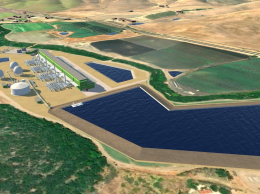Waste-to-energy company raises $500K, reports big loss
IN THIS ARTICLE
- Central Coast Topic
- Marissa Wenzke Author
By Marissa Wenzke Friday, December 19th, 2014
After reporting an operating loss for the third quarter, Greenbelt Resources Corp., a small public company based in Paso Robles, said it has raised $550,000 that will allow it to transition its existing R&D facility into a bio-refinery and research new products.
The company, which counts Diversified Ethanol Corp. as a subsidiary, provides small-scale systems for recycling food- and beverage-based waste and converting this waste into sustainable energy. CEO Darren Eng refers to the outputs as the “Three F’s” – fuel (ethanol), feed, fertilizer and filtered water. Its profits have faltered in recent months, as it reported a loss of $217,469 for the third quarter compared to an $18,144 profit a year earlier amid a steep decline in revenue. The company’s stock has been trading at two cents per share recently.
But the firm has a chance to try advancing operations thanks to a recent round of funding that came from individual accredited investors and was offered in the form of either restricted common stock or unsecured interest bearing convertible debentures.
The funding will help Greenbelt move toward managing its own facilities, according to a filing with the Securities and Exchange Commission. The firm’s modular automated systems for food waste usually retails for about $3 million to $6.7 million each but building and then managing systems for customers could be more profitable, Eng said, adding that “we can generate much higher numbers if we support our own systems than if we sell them.”
Systems produced by Greenbelt deal with processes such as fermentation, ethanol distillation and heat-and-energy generation, and are primarily sold to agricultural operations. The potential revenue from selling one of these systems to another company is a one-time $3 million to $4 million profit, Eng estimates, along with around $100,000 to $500,000 in support fees over the next nine to 10 years.
However, building and managing a plant featuring these systems — although it would require a higher initial investment — would turn out about $10 million to $18 million over the same period.
“Even though it’s a large investment upfront, the long-term gains are much more significant,” he said.
Greenbelt hopes to launch its first such facility in Paso Robles, but is also planning to continue selling these clean fuel systems to other businesses and growers.
Another use of the new funding is paying for market research that will further develop some of the firm’s fuel operations. Much of this research is currently working toward identifying feedstocks that provide the highest financial returns in converting and manufacturing commercially viable products such as advanced biofuels, feed and fertilizer. In particular, the firm is working on the manufacturing of an industrial-grade ethanol, Eng said
Related Articles
 Friday, October 21st, 2022
Friday, October 21st, 2022
Dubroff: Winds off the SLO coast hold part of the key to zero-carbon future
 Friday, April 29th, 2022
Friday, April 29th, 2022











